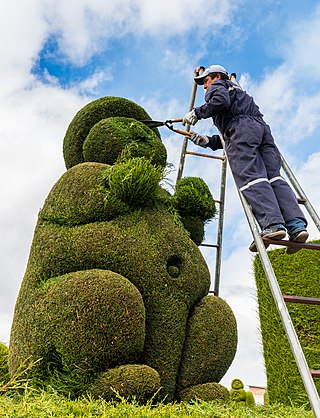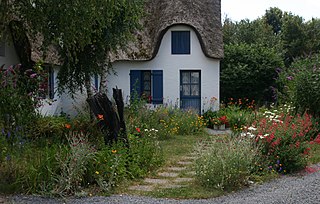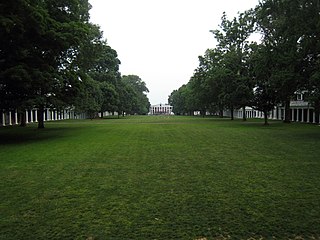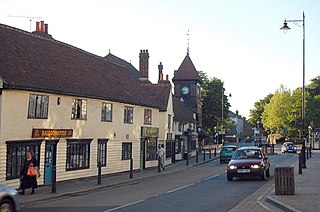Related Research Articles

Gardening is the practice of growing and cultivating plants as part of horticulture. In gardens, ornamental plants are often grown for their flowers, foliage, or overall appearance; useful plants, such as root vegetables, leaf vegetables, fruits, and herbs, are grown for consumption, for use as dyes, or for medicinal or cosmetic use.
Roundup is the brand name of a systemic, broad-spectrum glyphosate-based herbicide originally produced by Monsanto, which Bayer acquired in 2018. Glyphosate is the most widely used herbicide in the United States. As of 2009, sales of Roundup herbicides still represented about 10 percent of Monsanto's revenue despite competition from Chinese producers of other glyphosate-based herbicides. The overall Roundup line of products, which includes genetically modified seeds, represented about half of Monsanto's yearly revenue. The product is marketed to consumers by Scotts Miracle-Gro Company.

A wildlife garden is an environment created with the purpose to serve as a sustainable haven for surrounding wildlife. Wildlife gardens contain a variety of habitats that cater to native and local plants, birds, amphibians, reptiles, insects, mammals and so on, and are meant to sustain locally native flora and fauna. Other names this type of gardening goes by can vary, prominent ones being habitat, ecology, and conservation gardening.

Glyphosate is a broad-spectrum systemic herbicide and crop desiccant. It is an organophosphorus compound, specifically a phosphonate, which acts by inhibiting the plant enzyme 5-enolpyruvylshikimate-3-phosphate synthase (EPSP). It is used to kill weeds, especially annual broadleaf weeds and grasses that compete with crops. Its herbicidal effectiveness was discovered by Monsanto chemist John E. Franz in 1970. Monsanto brought it to market for agricultural use in 1974 under the trade name Roundup. Monsanto's last commercially relevant United States patent expired in 2000.

A lawn is an area of soil-covered land planted with grasses and other durable plants such as clover which are maintained at a short height with a lawn mower and used for aesthetic and recreational purposes—it is also commonly referred to as part of a garden. Lawns are usually composed only of grass species, subject to weed and pest control, maintained in a green color, and are regularly mowed to ensure an acceptable length. Lawns are used around houses, apartments, commercial buildings and offices. Many city parks also have large lawn areas. In recreational contexts, the specialised names turf, pitch, field or green may be used, depending on the sport and the continent.

Epping Forest District is a local government district in Essex, England. It is named after the ancient woodland of Epping Forest, a large part of which lies within the district. The council is based in the town of Epping. The district also includes the towns of Loughton, Ongar and Waltham Abbey and surrounding rural areas. The district is situated in the west of the county, bordering the north-eastern edge of London.
Garden design is the art and process of designing and creating plans for layout and planting of gardens and landscapes. Garden design may be done by the garden owner themselves, or by professionals of varying levels of experience and expertise. Most professional garden designers have some training in horticulture and the principles of design. Some are also landscape architects, a more formal level of training that usually requires an advanced degree and often a state license. Amateur gardeners may also attain a high level of experience from extensive hours working in their own gardens, through casual study, serious study in Master gardener programs, or by joining gardening clubs.

Sewardstone is a hamlet in the parish of Waltham Abbey, in the Epping Forest District of Essex, England. It is located south of the main built-up area of Waltham Abbey, lying between Epping Forest, Chingford and Enfield. It is 11.6 miles north-northeast of Central London and is in the London commuter belt.

Waltham Abbey is a town and civil parish in the Epping Forest District of Essex, within the metropolitan and urban area of London, England, 13.5 miles (21.7 km) north-east of Charing Cross. It lies on the Greenwich Meridian, between the River Lea in the west and Epping Forest in the east, with large sections forming part of the Metropolitan Green Belt.

Hainault Forest was a large, mostly wooded area of Essex, which was mostly destroyed after 1851. The popular outrage at the destruction of most of the forest was the catalyst for the creation of the modern environmental movement.

Concours international de roses nouvelles de Bagatelle is held in June of each year in the rose trial grounds of the Château de Bagatelle in Paris's 16th arrondissement.

Garden World Images, (GWI) previously known as the Harry Smith Collection, whose origins can be traced back to the early 1950s and is one of the oldest and largest library of horticultural/botanical colour photographs in the World. The library supplies images of flowers, plants and gardens to newspapers, TV shows, publishers and magazines around the world. GWI has been involved with hundreds of publications and influential books such as Dr. D. G. Hessayon's "Expert" series as well as all of the Greenfingers Guides.

The floral industry is focused on the production, distribution and sale of flowers for human enjoyment. As in many countries, the floral industry began in the late 19th century in the United Kingdom, where flowers were grown on a large scale on vast estates. The industry continues to diversify from the production of cut flowers to the production and sale of plants and flowers in many different forms. The global floral industry market size is estimated to be worth US$ 50040 million in 2022 and is forecast to increase to US$ 58030 million by 2028 with a compound annual growth rate of 2.5% during the review period.

Baby Bio is the brand name for a range of house plant and, more recently, outdoor plant care products created by Pan Britannica Industries Ltd (PBI) and currently owned by French company, SBM Life Science.
The Scotts Miracle-Gro Company is an American multinational corporation headquartered in Marysville, Ohio, where O.M. Scott began selling lawn seed in 1868. The company manufactures and sells consumer lawn, garden and pest control products, and soilless indoor gardening equipment. In the U.S., the company manufactures Scotts, Miracle-Gro and Ortho brands. The company also markets consumer Roundup.

Nazeing is a village and parish in Essex, England. Within the parish are the separate settlements of Upper Nazeing, Middle Nazeing, and Lower Nazeing. The Prime Meridian passes to the west of Lower Nazeing.
David Gerald Hessayon OBE is a British author and botanist of Cypriot descent who is known for a best-selling series of paperback gardening manuals known as the "Expert Guides" under his title Dr. D. G. Hessayon. The series started in 1958 with Be Your Own Gardening Expert and in 2008 it celebrated its 50th anniversary and the 50 millionth copy in print. They have become the best selling gardening books in history.

Garden roses are predominantly hybrid roses that are grown as ornamental plants in private or public gardens. They are one of the most popular and widely cultivated groups of flowering plants, especially in temperate climates. An enormous number of garden cultivars have been produced, especially over the last two centuries, though roses have been known in the garden for millennia beforehand. While most garden roses are grown for their flowers, often in dedicated rose gardens, some are also valued for other reasons, such as having ornamental fruit, providing ground cover, or for hedging.
The phrase "king of herbs" may refer to:
The All-America Rose Selections (AARS) is an award that was given annually, from 1940 to 2013, by the American rose industry to an outstanding new rose variety. The AARS selection was regarded as the most prestigious rose prize in the United States for 73 years. AARS was discontinued after 2013, and was replaced in 2016 by the new American Garden Rose Selections (AGRS) program.
References
- 1 2 "'Expert' book group sold to Japanese". Hertfordshire Mercury. 31 August 1990. Retrieved 14 November 2023.
- ↑ "Dr D G Hessayon: So, how does the expert's garden grow?". The Telegraph. 9 February 2009. Retrieved 14 November 2023.
- ↑ Hessayon, D. G. (14 November 2023). Be Your Own Gardening Expert. [With Illustrations.]. Pan Britannica Industries.
- ↑ "The cricket-loving doctor makes another big score". Manchester Evening News. 24 June 1977. Retrieved 14 November 2023.
He joined Pan Britannica Industries, a small garden chemicals firm of which he is now chairman and managing director, and has grown to be the second biggest of its kind in the country
- ↑ "PBI HOME & GARDEN LIMITED filing history - Directors' Report and Accounts for year ended 30 September 1990". Companies House. Retrieved 14 November 2023.
- ↑ "Pan Britannica becomes pbi Home & Garden - ProQuest". ProQuest 229899186 . Retrieved 17 June 2022.
- ↑ Hastings, Hannah (23 September 2019). "Epping Forest MP visits retirement home builders following contaminated land concerns". Epping Forest Guardian. Retrieved 14 November 2023.
- ↑ "PBI HOME & GARDEN LIMITED". Companies House . Retrieved 17 November 2023.
Company status Dissolved Dissolved on 10 March 2015
- ↑ Wilkinson, P; Thakrar, B; Shaddick, G; Stevenson, S; Pattenden, S; Landon, M; Grundy, C; Elliott, P (1 February 1997). "Cancer incidence and mortality around the Pan Britannica Industries pesticide factory, Waltham Abbey". Occupational and Environmental Medicine. 54 (2): 101–107. doi:10.1136/oem.54.2.101. ISSN 1351-0711. PMC 1128659 . PMID 9072017.
- ↑ Wilkinson, Paul, ed. (2006). "Investigation of a putative disease cluster". Environmental epidemiology (PDF). Understanding public health. Maidenhead: Open Univ. Press. ISBN 978-0-335-21842-4. Archived from the original (PDF) on 22 July 2011. Retrieved 16 June 2010.
- ↑ "Inquiry is sought over pesticide cancer fears" . Independent.co.uk . 22 October 2011. Archived from the original on 24 May 2022.